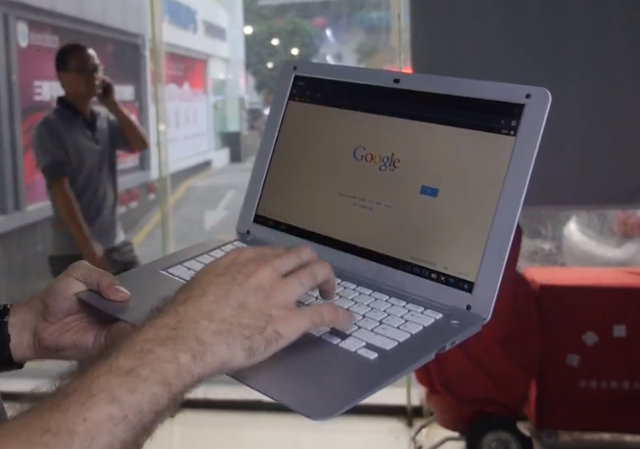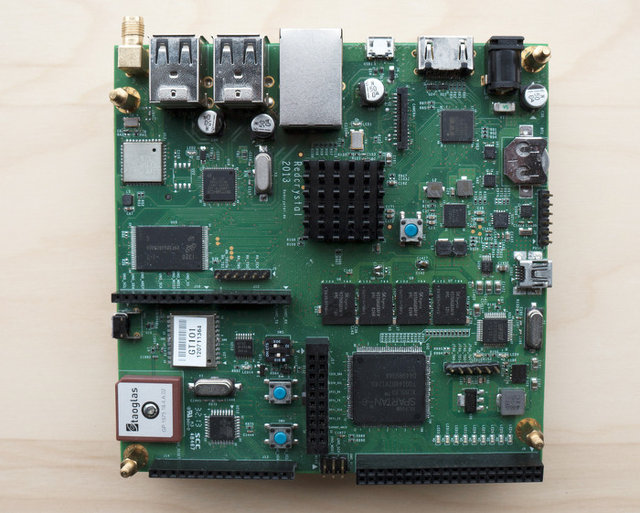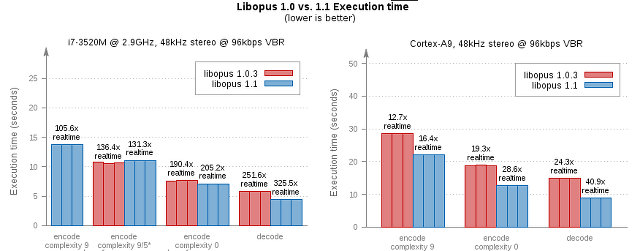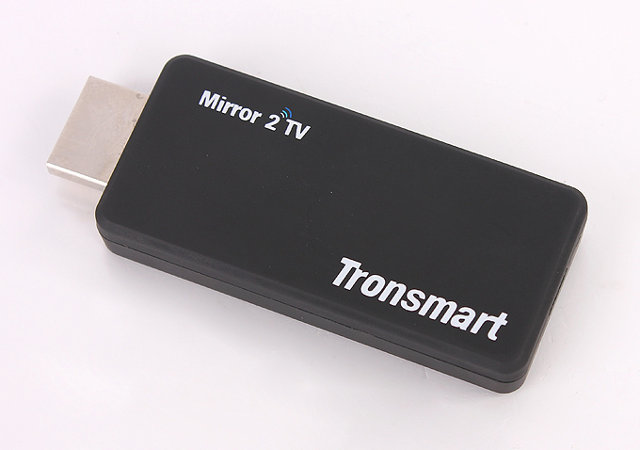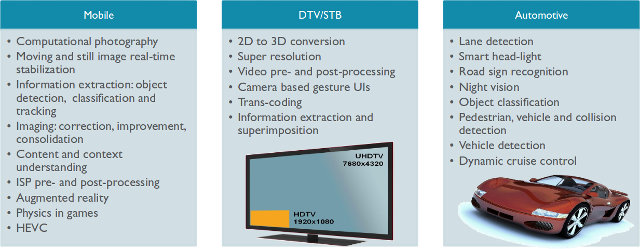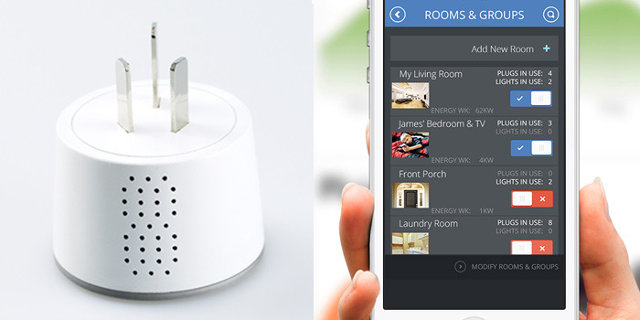Charbax has just found a 13.3″ laptop powered by WonderMedia WM8880 dual core Cortex A9 processor running Android 4.2 manufactured by Shenzhen Honlin, and selling for about $108 in China (retail or factory price?). That’s the first time I see a Chinese ARM based laptop with a somewhat decent screen, so I went to Aliexpress to find the device or a similar one, and after going through all the 13.3″ Android tablets, I found a no brand laptop, model GA1331F, sold by Shenzhen GA Technology Development with apparently the same specs for about $170 including shipping via EMS. GA1331F Laptop specifications: SoC – WonderMedia WM8880 Dual-Core ARM Cortex A9 @ 1.5GHz with Mali-400 MP2 GPU System Memory – 1GB DDR3 RAM @ 1033MHz, with an option to get 2GB Storage – 8GB or 16GB MLC NAND flash, SD card slot (Up to 32GB) Display – 13.3″ LCD screen (1280 x 800) […]
Geniatech Releases XBMC Linux Image for AML8726-MX based Media Players
A couple of week ago Geniatech released the source for XBMC for Android, and today I’ve been informed they’ve released an XBMC Linux image for their media players based on AMLogic AML8726-MX dual core Cortex A9 SoC, just a few days after the release of MX Linux v1.00 RC1 working for MX2REF, G18REF and g02refDongle (These are not product names, but board codes that can also be found in ro.product.device or ro.product.board in build.prop of Android firmware). You can download MX_BOX-Linux_XBMC20131205.zip which is said to contain the XBMC Linux image for ATV1200, ATV520, ATV400, ATV360, etc… However, it’s said not to work for HDMI dongles such as ATV120, contrary to MX Linux. I haven’t been able to download the file within a reasonable amount of time, so I haven’t been able to check the content, and installation instructions. An anonymous source told me it was likely Geniatech just took the community […]
Crystal Board Combines Rockchip RK3188 ARM SoC with Xilinx FPGA and Arduino Compatible Board (Crowdfunding)
Red Crystal, a German startup, has just introduced the Crystal Board, a 3-in-1 development board with Rockchip RK3188 SoC running Linux or Android, an Arduino UNO compatible board, and a Xilinx Spartan-6 FPGA. The concept is a similar to the UDOO board, but adds an FPGA. The company has launched a Kickstarter campaign to gather funds to manufacture the Lite and Pro versions of the board for respectively $149 and $179. Crystal Board specifications (Lite and Pro versions): SoC – Rockchip RK3188 ARM Cortex-A9 quad core up to 1.8Ghz + Mali-400 MP4 GPU MCU – Atmel Atmega328 SMD FPGA – Xilinx Spartan6 XC6SLX9 with 9152 logic cells System Memory – 2GB DDR3 @ 1066MHz (1GB DDR3 @ 1066MHz for Lite version) Storage – micro SD card slot, SPI flash Video Output – HDMI 1.4 Connectivity: 10/100M Ethernet port Wi-Fi 802.11b/g/n with antenna. Dual band for Pro version, 2.4GHz band for […]
Opus Open Source and License-free Audio Codec Decreases Latency over VoIP Codecs, (Slightly) Betters MP3 and AAC Quality
I’ve just stumbled upon Opus, a relatively new audio codec, with the release of version 1.1 implementation which improves encoding quality for VBR audio, automatically detect audio or speech to select the best encoding mode, and improved 5.1 surround quality/compression ratio. The new release also bring speed improvements for all architectures, and specifically for ARM, where decoding uses around 40% less CPU and encoding uses around 30% less CPU thanks to the use of NEON compared to an earlier version. You can go to the online demo page to find more about the latest released, and try some of the latest improvements. This all looks fun, but I wanted to know more about Opus, and especially how it compares against MP3 or AAC. It turns out Opus was not originally designed to compete against MP3/AAC which are used to store audio, but instead it was meant to be used for […]
AIRTAME is a Wi-Fi Display HDMI Dongle for Windows, Linux, and Mac (Crowdfunding)
Earlier today, I wrote about Tronsmart T1000 Mirror2Tv, a $30 Wi-Fi Display adapter that can mirror the display from Android, iOS, and Windows devices and computers to your HDMI TV via Wi-Fi, and I’ve been informed a somewhat similar device called AIRTIME had a very successful Indiegogo campaign albeit selling for over $100 including shipping, and with shipping expected for May 2014, so I decided to have a closer look. AIRTIME specifications have not been fully release, but we still get some information: Processor – ARM @ 1GHz System Memory – 512MB RAM Wi-Fi – 802.11 b/g/n Video Output – HDMI 1.4 with CEC and MHL – Up to 1080p resolution Audio – 2 channel stereo with variable bit rate, work in progress for surround sound 5.1 support USB – 1x micro USB for power, 1x USB host port for accessories Power Consumption – About 500ma @ 5V via MHL […]
Tronsmart T1000 Mirror2TV EZCast, Miracast, Airplay, DLNA HDMI Dongle Sells for $29.99
There has already been several dongles released to the mark that support Miracast, Airplay, and DLNA, either a subset, or a combination of the standards. One of the cheapest is iPush that now sells in the low $20, but there are different models, and one of them is only supporting DLNA. A couple of months later, EZCast was released with support for DLNA, as well as Miracast and Airplay (with some limitations), and their own EZCast support. EZCast is supported on several hardware dongles that often sell for about $35 to $45, and although it’s not outrageously expensive, you can get full single or dual core Android HDMI TV for this price. I’ve just come across a new product called Tronsmart T1000 Mirror2TV sold for $29.99 including shipping by GeekBuying, and a couple of sellers on Aliexpress, that appears to be another EZCast dongle with support for Miracast, Airplay, and DLNA. […]
Practical Applications and Benchmarks of GPU Computing via RenderScript and OpenCL with ARM Mali-T6XX GPU
Since the announcement of ARM Mali-T604 in 2010, ARM has explained that GPGPU (General Purpose computing on GPU), aka GPU Compute, would be one of the key features of their new Mali graphics processor, and the company now expects GPGPU to become mainstream in embedded and mobile devices in 2014 and beyond. I’ve just come across a presentation by Roberto Mijat, technical marketing manager at ARM, entitled “Unleashing the benefits of GPU Computing with ARM Mali” which shows practical applications and use cases where the use of RenderScript, or OpenCL can make massive performance improvements, at much lower power consumption, over the same parallel tasks processed by the CPU only. Let’s have a look at some of the most interesting slides. GPU compute can be used for multiple applications in mobile, multimedia, and automotive sectors. GPU Compute for H.265 / HEVC HEVC aka H.265 is the next generation codec providing […]
$27 Plugaway Wi-Fi Smart Sockets Support Australia, China, Europe, U.K. or U.S. Standards (Crowdfunding)
Until now, Broadlink SP1 was the cheapest ($32) Wi-Fi smart socket I found. It supports Australian and Chinese plugs, and Android and iOS smartphones. The two main downsides is that the application is in Chinese by default (English can be installed via a firmware upgrade), and although the top of the socket support international plugs, the plug of the device only support Australian / Chinese standard, and you may need an adapter to connect the device to your wall socket. There’s now a similarly priced option in Kickstarter called Plugaway that supports Australia, China, Euro, U.K. or U.S. standards, can measure power consumption, dim lights, and comes with Android and iOS apps, with Windows planned for a future release. Specifications: MCU – Atmel ATmega128 up to 16MHz with 128 KB flash Wi-Fi – Marvell 88W8686 Wi-Fi 802.11 b/g chip, to be upgraded to support 802.11n for longer range Current sensor […]


